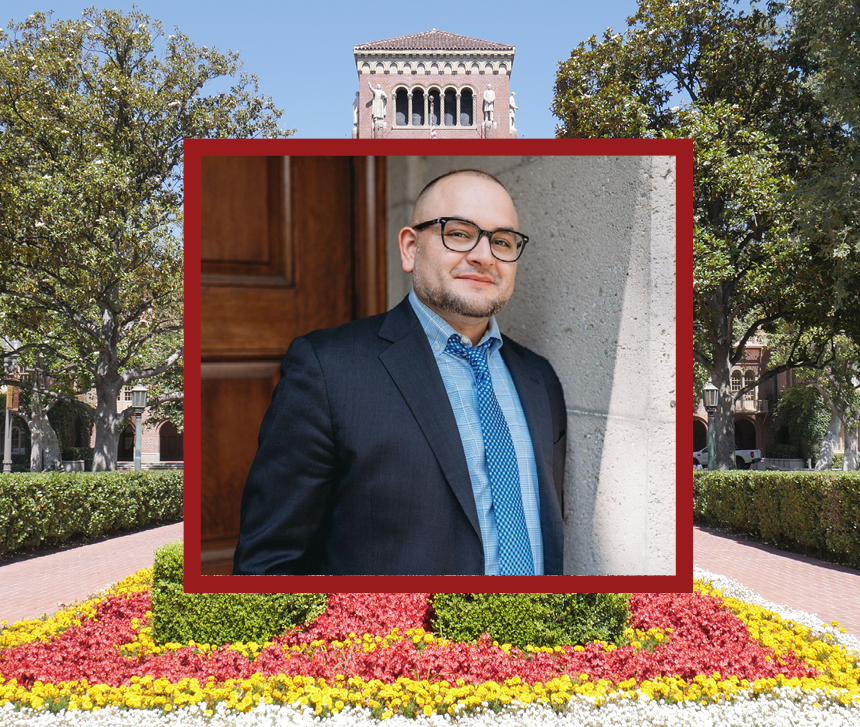Dr. Adrian H. Huerta, Assistant Professor in the Pullias Center for Higher Education at the USC Rossier School of Education, has been selected as a recipient of the prestigious 2022 National Academy of Education (NAEd)/Spencer Postdoctoral Fellowship.
Dr. Huerta, who joined Pullias/Rossier in 2019, is one of 25 Fellows selected by NAEd out of an extremely competitive pool of 258 education scholars. The fellowship award of $70,000 is intended to assist with the fellow’s salary replacement and research expenses for the fellowship period. This award joins an impressive list of grants that Dr. Huerta has received this year, totaling more than $1.1 million in funding.
“Adrian Huerta’s research, dedication and contributions to education access and equity has and will continue to benefit so many in the community,” said Pedro Noguera, dean of the USC Rossier School of Education and Emery Stoops and Joyce King Stoops Dean’s Chair in Education. “The NAEd/Spencer Postdoctoral Fellowship is an exceptional honor for an exceptional colleague.”
Dr. Huerta uses qualitative methods to broadly explore the sociocultural experiences of boys and men of color and gang-associated youth/young adults with a focus on college access, (in)equity, and success. His publications appear in American Behavioral Scientist, Journal of College Student Development, Journal of Diversity in Higher Education, The Urban Review, Urban Education, and others. He is co-principal investigator on a $990,000 grant from the U.S. Department of Education to develop pathways to higher education for gang-associated youth and young adults to earn college degrees, certificates or credentials with Long Beach City College, called the LBCC Phoenix Scholars.
“Dr. Huerta’s exciting research with men of color, gang-affiliated youth and student parents is helping higher education move forward toward a more diverse and equitable environment, while supporting student success,” stated Adrianna Kezar, Director of the Pullias Center for Higher Education. “We are so very proud of his latest achievement as a NAEd/Spencer fellow.”
Dr. Huerta’s research has also been supported by the ECMC Foundation, and the Institute for Research on Poverty/JPB Foundation. He was a recipient of the American Educational Research Association’s Minority Dissertation Fellowship in 2014-15.
He earned his Ph.D. and M.A. in Education from the University of California Los Angeles, a master’s degree from The Ohio State University’s College of Education and Human Ecology as well as a B.S. in Human Services from the University of Nevada, Las Vegas. He is a member of the inaugural cohort of Health Affairs’ Racial Equity Health Fellows, which supports translating his gang-focused research to public health policymakers.
The National Academy of Education/Spencer Postdoctoral Fellowship provides funding and professional development to early -career researchers whose projects address critical issues in the history, theory or practice of formal or informal education, at the national and international levels. NAEd advances high-quality research to improve education policy and practice. Founded in 1965, the NAEd consists of U.S. members and international associates who are elected on the basis of scholarship related to education. The Academy undertakes research studies to address pressing educational issues and administers professional development fellowship programs to enhance the preparation of the next generation of education scholars.
The Pullias Center for Higher Education, part of the USC Rossier School of Education, is the world’s leading research center on student access and success in higher education, advance innovative, scalable solutions to improve college outcomes for underserved students and to enhance the performance of postsecondary institutions.
Since 1995, the mission of the Pullias Center is to bring a multidisciplinary perspective to complex social, political and economic issues in higher education. Both directly and through our research, the Center engages with institutional leaders, policymakers and the community at large to address the major challenges in educational equity today.








